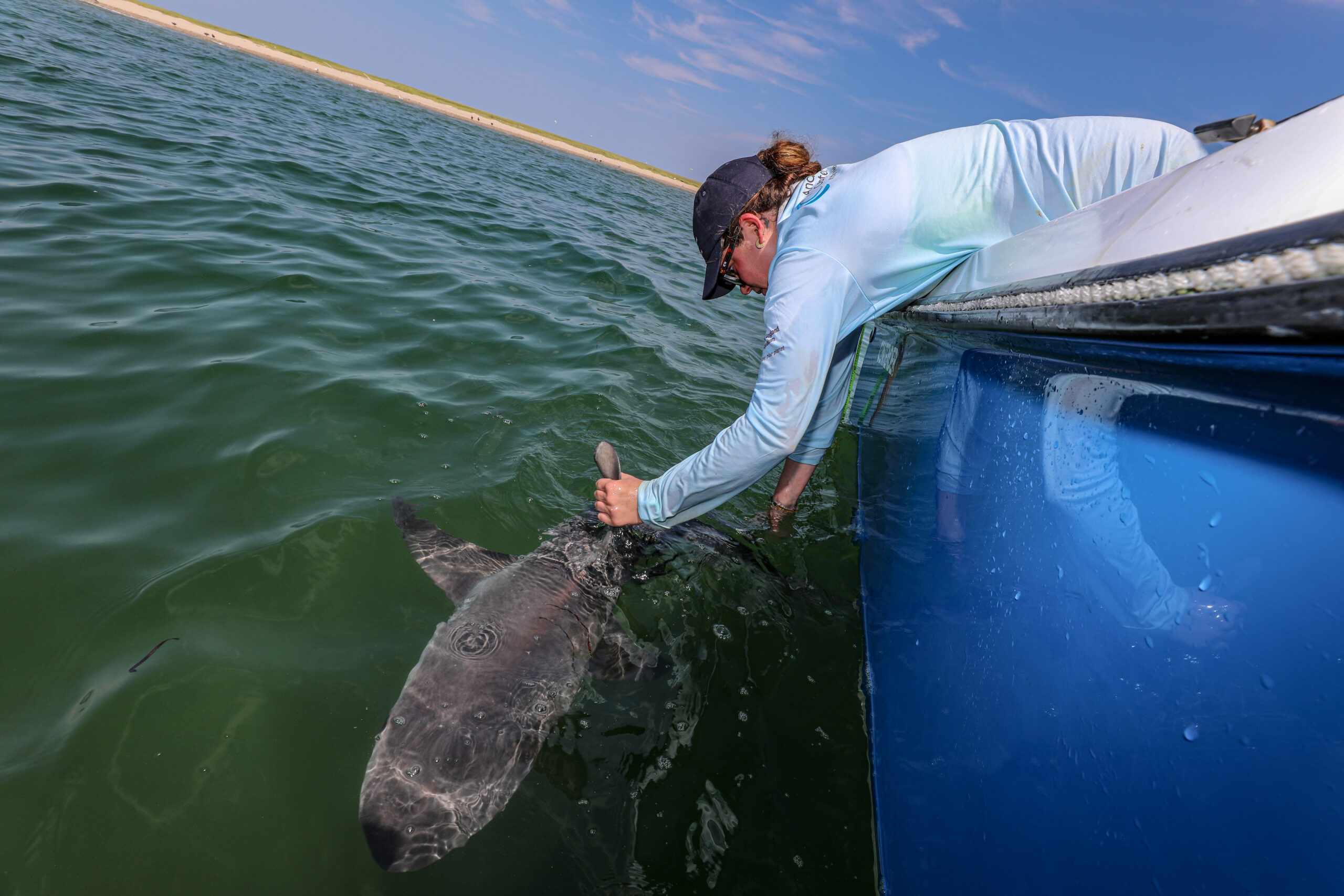
BOSTON, MASS. (July 6, 2023) – As Shark Week (July 23 to 30) and Shark Awareness Day (July 14) approach, the New England Aquarium’s shark research team is available for interviews about their adventurous work on research vessels in Boston Harbor, Nantucket Sound, the Dry Tortugas off Florida, Georgia, and sites around the world as they tag and monitor various species ranging from nurse sharks and oceanic white tip sharks to bull sharks, sand tigers, sandbar, and white sharks.
There are over 500 species of sharks in the world, and scientists in the Aquarium’s Anderson Cabot Center for Ocean Life have tagged more than 40 different species and related animals in the wild, many of them in New England waters. These scientists work up-close with ocean life, dedicating their careers to protecting these animals with cutting-edge conservation research.
Below is a list of Aquarium experts representing a wealth of knowledge and experience.
As Chief Scientist and Vice President, Dr. John Mandelman oversees the Aquarium’s applied research and conservation institute. He focuses on solutions-based science and emerging technologies to save vulnerable species, such as studying catch-and-release fishing and mortality impacts on sharks, rays and skates, as well as other fishes. He was recently lead author on a chapter on reducing fisheries mortality in sharks in the third edition of the well-known publication, “Biology of Sharks and Their Relatives.” His expertise ranges from conservation physiology, fisheries ecology and management, and more.
Dr. Nick Whitney, Senior Scientist and Chair of the Aquarium’s Fisheries Science and Emerging Technologies Program, specializes in using high-tech tags that include accelerometers and cameras to answer questions about the secret lives of marine animals. His work has included numerous studies on how sharks respond to catch and release fishing, and he just returned from an annual June/July fieldtrip to the Dry Tortugas, FL, where he was tagging nurse sharks on their shallow water mating grounds. These sharks gather to mate every summer in clear, shallow water, providing scientists with an unparalleled opportunity to study their natural behavior. This shark population has been the focus of ground-breaking work that has resulted in numerous academic papers, media features on “CBS National News” and National Geographic, as well as television documentaries.
For eight years, Dr. Jeff Kneebone has dedicated his research to a range of species including sand tiger sharks, common thresher sharks, black sea bass, yellowfin tuna, bluefin tuna, and thorny skates. He spends time on research vessels, catching sharks, tagging them, and releasing them to track their survival and movement. He works closely with commercial and recreational fisherman to collect information that will aid in the assessment of fish stocks and fishery management and sustainability. His work has resulted in many scientific papers.
Dr. Ryan Knotek’s research centers on the interactions between sharks and fishing industries in New England waters and beyond. In particular, he investigates what happens to sharks after they are caught and released to determine survival rates and identify best fishing practices that promote a healthy release. He collaborates closely with fishing industry partners to conduct his research, deploying cutting-edge electronic tagging technologies, underwater videography, and other techniques to collect information needed to tackle these questions—such as days to weeks of movement data from tagged sharks. His current research focuses on porbeagle sharks, spinner sharks, bull sharks, oceanic whitetip sharks, and thorny skates.
For the last three years, Caroline Collatos, a PhD student and Aquarium shark researcher, has been leading work during the summer months off Nantucket to catch, tag, and release sandbar sharks. More than 100 sharks, mostly females measuring up to 5 ½ feet, have been tagged. Her goal is to gather data, using acoustic telemetry, about the annual presence, habitat use, and migration patterns of the local shark population. It’s a long-term study to better understand the behavior and trends among the sharks there each year.
An adjunct scientist with four decades of experience studying sharks, particularly white sharks, John Chisholm is a go-to expert—identifying more than 500 individual white sharks from Canada to Florida—and is frequently in demand with the increasing number of sightings around Cape Cod’s waters every year. He verifies shark sighting reports made by the public through the Sharktivity app. His research has also focused on spiny dogfish, sand tiger sharks, porbeagles and basking sharks.
MEDIA CONTACT:
Pam Bechtold Snyder – psnyder@neaq.org, 617-686-5068
